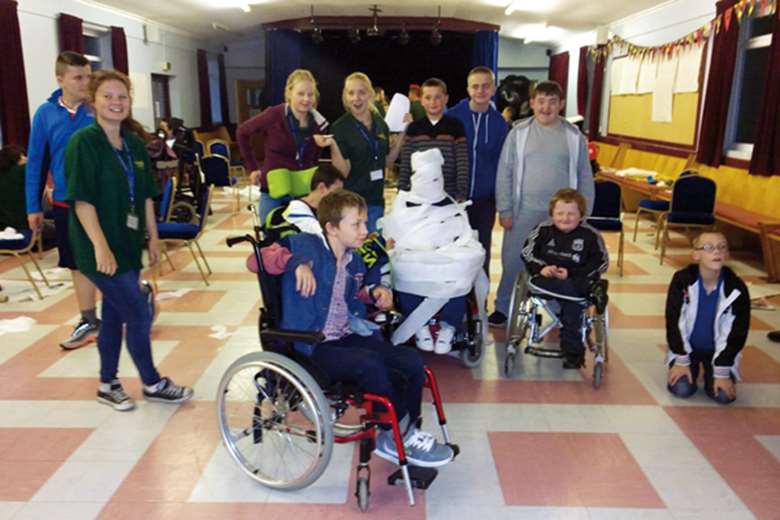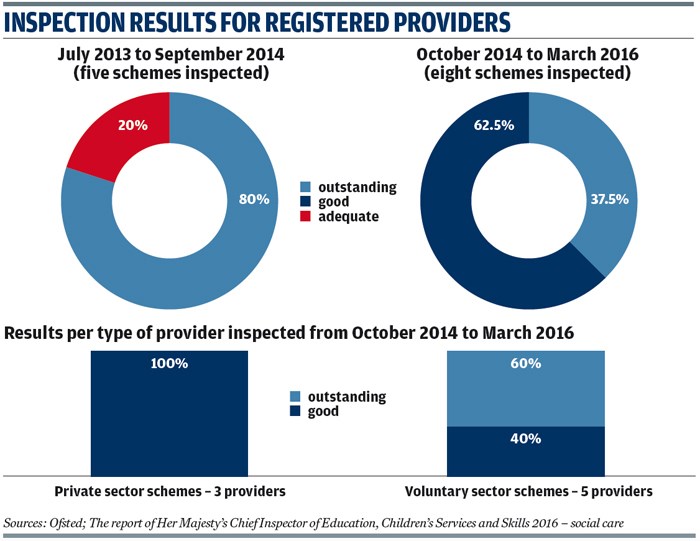Behind the Inspection Ratings: Holiday scheme standards
Jo Stephenson
Tuesday, August 16, 2016
Revised inspections for residential holiday schemes for disabled children show that as well as providing high-quality care, the best schemes "add considerably to young people's experiences, progress and development".

In recent years, the inspection regime for residential holiday schemes for disabled children in England has changed significantly to reflect the aims and nature of this type of provision.
Schemes are generally small scale, run by volunteers and short term - with some providers operating for just one week per year.
The focus is on providing enjoyable activities for children and young people with complex needs, and such schemes often give youngsters their first taste of independence and the chance to try new things away from parents and carers.
Meanwhile, schemes also offer respite to families who may also benefit from a break from caring responsibilities.
Previously, such schemes were subject to the same regulatory framework as children's homes "in recognition of the vulnerability of disabled children being cared for away from their parents". But many of the rules - such as requirements to provide education, draw up placements plans and ensure children were in touch with their parents, plus a ban on adults sharing a room with children - simply did not fit this type of provision.
The government recognised the regulations were too onerous and difficult for providers to meet, and in 2012 consulted on changes designed to make regulation more proportionate - including reducing inspection to once a year and cutting fees - a move welcomed by the sector.
"Providers of holiday schemes for disabled children have found the requirements and costs of the current regulatory framework extremely burdensome," said the Department for Education's consultation document. "We are therefore aiming to revise the requirements on these schemes so that they reflect much more clearly the differences between holiday schemes and mainstream children's homes."
In July 2013, new regulations for residential holiday schemes for disabled children came into force. Since then, all providers must be registered with Ofsted and meet national minimum standards for this type of provision.
Under the standards, providers must ensure "children's views, wishes and feelings are acted upon in the day-to-day running of the scheme and important decisions or changes in the child's stay".
Registered managers must have at least two years' experience relevant to working with children with complex needs and at least one year's experience supervising and managing professional staff.
Meanwhile, staff must be carefully selected and vetted and should get high-quality training to ensure children are looked after by people "trained and competent to meet their needs".
Ofsted produces an inspection framework and handbook for providers, which were updated in June with some changes designed to reduce the disruption inspections can cause for schemes.
Key changes include the amount of notice schemes are given before inspection to reflect the fact it is harder for staff and managers to drop everything if inspectors turn up out of the blue.
They will now be given up to five days' notice. "This was in response to feedback from providers about how no notice inspections impacted on their ability to staff and manage holiday events," explains an Ofsted spokesman.
Ofsted has also changed its timetable for collecting data from providers so they don't have to provide all data at the start of an inspection.
"This was to reduce the impact of inspection on providers and the children attending the holiday scheme," the Ofsted spokesman adds.
Schemes will no longer be judged on "partnership working" as a category on its own. Instead, inspectors will comment on partnerships as part of other inspection judgments.
Inspection results show a high standard among the small number of schemes registered with Ofsted.
As well as providing high-quality and consistent care, the best schemes "add considerably to children and young people's experiences, progress and development", says the inspection framework.
This includes providing activities and experiences that give young people "opportunities to develop their independence and participation in local community provision".
Immediately after Ofsted started inspecting this type of provision from July 2013 to September 2014, five schemes were visited. Four were found to be "outstanding", while one was judged "adequate" - the equivalent of "requires improvement" under the current regime.
The regulator's annual report on social care shows that as of March 2016, there were 11 registered providers.
A total of eight schemes were inspected between October 2014 to March 2016 and three were judged outstanding, while five schemes were judged good (see graphic).
Ofsted has published proposals for residential holiday schemes for disabled children to be included in a common inspection framework covering many children's social care services, including children's homes, residential special schools and further education colleges, from 2018 onwards. Ofsted's aim is to provide comparable and consistent reports across a wide range of settings to ensure inspections focus on the progress and experiences of children, wherever they live or receive help.
The plans, included in the Future of Social Care Inspection document published in June, are out to consultation until 9 September.
Young people enjoy ‘outstanding' breaks
Heswall Disabled Children's Holiday Fund | The Wirral | August 2015
This will be the 55th year in a row that Heswall Disabled Children's Holiday Fund has provided a week-long residential experience for about 30 children aged between eight and 16.
The scheme - which is entirely run by volunteers and funded through donations and fundraising activities - has evolved over the years and now operates from the Barnstondale Centre in the Wirral.
It has achieved an outstanding rating from Ofsted in each inspection it has undergone.
The scheme does not have a set policy on the level of needs it caters for, working with parents to try to accommodate children wherever possible, explains chair and registered manager Vinny Keating.
Families fill in an application form and all new children - and previous attendees whose needs have changed over the past year - get a home visit, something any family can request.
"We look at the level of care a child receives at home," says Keating. "If the parents or carers are doing something on a daily basis, can show us how to do it and are confident we can do it, then it is really up to them."
Children and young people enjoy activities including trips to the cinema, a meal out, swimming and activities based at camp.
This year, the programme includes bushcraft skills and a practical science demonstration.
Planning is key, says Keating, and "a lot of work goes on behind the scenes".
Before the main holiday week, the 32 or so helpers get together for the weekend to run through policies and key training, which always includes safeguarding training, and this year also featured paediatric first aid and manual handling and use of hoists.
"We also discuss individual cases with the lead helps who will be responsible for that child, so they are forewarned about what they're going to be dealing with," says Keating.
"Because all of that is in the back of their mind, they can then concentrate on the ethos of the camp which is to look after the child first and not the disability."
The scheme's success hinges on its volunteers and their skills and vast experience. Keating has been a volunteer helper for more than 20 years, having attended the camp himself from the age of 11 to 16.
In addition, the scheme makes a point of ensuring volunteers get a lot out of the experience, which is why they keep coming back and can then mentor new helpers.
"If they want to come and help us, then we're going to support them, by helping them develop as individuals and giving them references for jobs," he says.
Like other managers of residential holiday schemes for disabled children, Keating admits that he was rather apprehensive at the introduction of a new inspection regime and national standards for this type of provision.
However, the reality was Heswall Disabled Children's Holiday Fund was doing most things already and "had to change very little", he says.
What the standards and inspection regime do offer is a "guarantee" for those less familiar with the scheme, says Keating.
"We get a big rubber stamp and that does deliver a lot of confidence to the parents and others," he adds.




